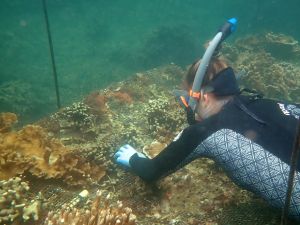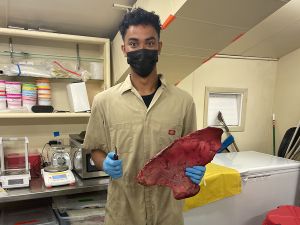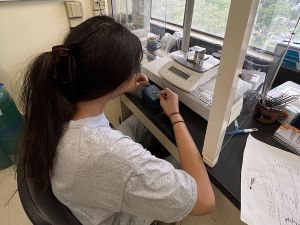2023 SURF Projects
Identifying Sea-level Rise Impacts to Community Infrastructure in Koʻolaupoko

Faculty mentor: Chip Fletcher (and Colin Lee, JD, Juliette Budge, post-doc), Earth Sciences, UH Mānoa
With increasing sea-level rise erosion affecting shorelines and infrastructure around the Hawaiian Islands, building community resilience becomes critical for climate adaptation. This project contributed to a coastal vulnerability assessment in the Koʻolaupoko district of Oʻahu, and began evaluating sea-level rise impacts to known historical Hawaiian cultural sites in the area, for the student’s Global Environmental Studies thesis project.
Growing Corals for Reef Restoration

Faculty mentor: Rob Toonen (and Claire Lewis, post-doc), HIMB, UH Mānoa
Climate change is famously impacting coral reefs through excess warming and ocean acidification, putting both the future growth and ultimate survival of corals at risk. This project is part of a broader DARPA artificial reef project with this work contributing to the efforts to improve coral growth for restoration, here exploring the effects of filtration systems, and nutrient levels, on coral growth rates and thermal tolerance.
Effects of changing climactic and oceanographic conditions on humpback whale abundance and growth

Faculty mentors: Lars Bejder (and Martin Van Aswegen, grad student), HIMB, UH Mānoa
Over the last decade there have been marked declines in humpback whale abundance and reproductive success throughout the North Pacific, potential linked to marine heatwaves associated with climate change. This project uses aerial photogrammetry to measure whale sizes and conditions to evaluate the linkage between whale morphometrics and large-scale climate and local-scale ocean productivity metrics of their feeding grounds.
The long view of drivers of change and Hawaiʻi ecosystem responses

Faculty mentor: David Beilman, Geography and Environment, UH Mānoa
Meeting climate adaptation goals requires the best available information on ecosystem behavior in response to climate change stressors. This project contributed to assessing native plant responses to drought and fire regime changes through carbon analyses, and also used GIS to explore possible locations of ephemeral wetlands on Kahoʻolawe, with special consideration of the predicted future of a drier island.
PROGRAM DETAILS
These four projects were conducted during the 10 weeks of the PI-CASC Summer Undergraduate Research Fellowship program in 2023. The SURFers worked with their mentors to carry out these impressive climate adaptation science projects, participated in professional development workshops, and presented their results at a symposium at the end of the summer.

